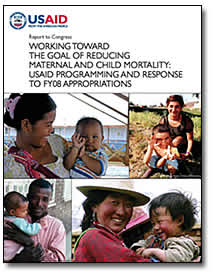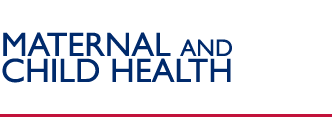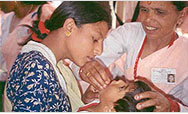Maternal & Child Health
| |
 |
| On July 31, 2008, USAID released a new report to Congress titled "Working Toward the Goal of Reducing Maternal and Child Mortality: USAID Programming and Response to FY08 Appropriations." Download the full report
|
Building a Brighter Future
USAID is committed to improving
the health and well-being of children and families
in the developing world.
For 40 years, the United States Agency for International Development (USAID) has helped children throughout the world grow into healthy, productive adults. Progress in child survival and disease control has long been, and remains, among the Agency’s major accomplishments. USAID-funded interventions – oral rehydration therapy (ORT) and zinc supplementation to treat diarrhea; basic immunizations for common ailments; micronutrient supplementation to treat malnutrition; and more – save the lives of approximately 6 million children under 5 each year. USAID assistance is also instrumental in other areas of child and maternal health, such as the fight against HIV/AIDS and other infectious diseases.
A mother’s health profoundly affects the health and well-being of her children. While maternal mortality remains unacceptably high throughout the developing world, a number of USAID-assisted countries have achieved significant reductions in maternal deaths from pregnancy-related causes. USAID’s approach to improving maternal health and the health of newborn children includes community involvement, evidence-based interventions (interventions that, after rigorous testing, have documented proof of their effectiveness), and compassionate high-quality services. Key interventions such as iron supplementation, malaria treatment, safe and clean delivery, and treatment of obstetric and newborn complications are improving the health outcomes for mothers and infants around the world.
USAID's Maternal & Child Health Programs
 |
| Source: USAID/Senegal |
Health Research Program (HaRP)
Through collaborating partners, USAID's Health Research Program (HaRP) identifies the challenges for maternal and child health in developing countries and countries in transition, and designs the most effective approach to overcome them. These challenges range from infectious diseases to malnutrition to health services delivery by community health workers.
Visit the HaRP Web site at http://www.harpnet.org
|


